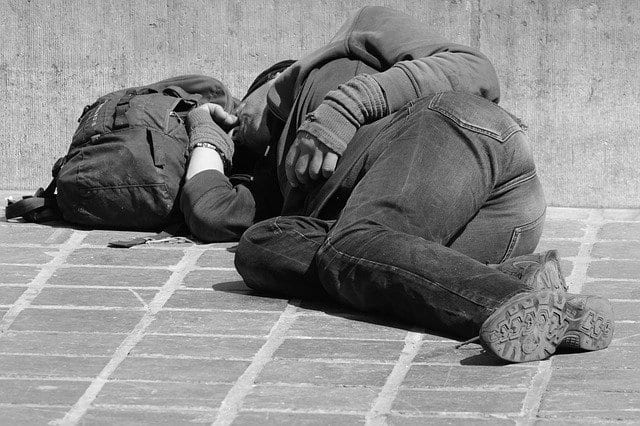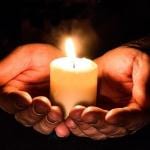
This morning I opened Twitter to check in on my friends; I ended up watching some short videos from Shirley Raines, who serves the homeless on Skid Row in Los Angeles, California.
Ms. Raines records some of each of her visits to Skid Row, so that her donors can see what their money is funding. Earlier this week she showed her car full of Kool Aid juice boxes, because there were not enough water bottles for sale at the supermarket due to hoarding. She mentioned that she hadn’t been able to get drinking water to the homeless for three weeks. This caused such an outcry and an outpouring of help that within a few days she had 500 water bottles and bags of snacks to give away besides. Someone even managed to give her more travel-sized bottles of hand sanitizer.
Ms. Raines showed small video clips of her trip to Skid Row: the homeless running to her when they saw her coming; the way she and a fellow volunteer attempted to hand out meals and supplies while following the rules of social distancing; and a conversation she had with a homeless man. She asked if the man had been told anything about COVID-19, and he said he hadn’t. She asked if he had watched any press conferences, and he said no. He didn’t have access to a television. No one had been to Skid Row to talk to the people there about the risk.
The whole state of California has been ordered to shelter in place. And at least this particular group of homeless people have been given no shelter, no way to keep clean, nothing. They’re trapped outside, living crammed together in tents, during a pandemic. Ms. Raines, who isn’t a doctor, is desperately trying to tell them what to do to keep from spreading the disease like wildfire through the tent camps on Skid Row, because if she didn’t, they wouldn’t have a clue. She’s driving all over Los Angeles with donated money, buying sandwiches and drinks to feed them so they don’t die of hunger and thirst while the rest of the city is sheltering in place.
I opened Facebook and checked in on the Friendship Room. There are so many things going on there. Poor people keep coming to the door to ask for milk and bread to get through the weekend. Homeless people are coming to use the outdoor sink that volunteers installed, to wash their hands. Molly had to field a horrified text message from a frequent guest of theirs last week. This is a poor woman with no access to the internet or television, but she has a flip phone. She heard about COVID-19 through neighborhood gossip, and she was terrified. She didn’t know what to do to keep safe. Those of us in Ohio who have a television or the internet can tune in to hear Governor DeWine’s daily updates; he’s doing a great job keeping us informed. But the very poorest don’t know what’s going on. The homeless don’t know what’s going on.
Besides this woman, there are drug addicts on the streets of Steubenville who have suddenly found themselves in withdrawal. There are prostitutes who can only feed themselves and stay alive by violating social distancing in about the worst way imaginable. And they have nowhere to turn for help.
The Friendship Room is staying open, filling their outdoor free pantry with donated food; they’re begging for boxes of shelf-stable milk, granola bars and the like to give away so that people can stay fed. They need toiletries and cleaning supplies to give away. They’re answering text messages. They’re trying to arrange pen pals for their usual guests, so they won’t be completely alone. But they can’t welcome any of these people inside to talk to them, for fear of spreading the disease. They’re doing the best they can, but they can’t meet every need.
I scrolled through the rest of my Facebook feed, and saw a photograph of men lying on the ground, inside the outlines of painted rectangles on concrete. A caption said they were lying six feet apart, but it looked more like two or three feet apart to me. There wasn’t any roof or canopy over their heads. They were wearing dirty clothes.
Googling around, I found that this was taking place in Las Vegas. It was reported on the news that there had been a confirmed case of COVID-19 in a homeless shelter there, so the shelter was emptied for cleaning. A grid was drawn on the parking lot, and the homeless men were ordered to stay six feet apart and lie on the ground outdoors. Again, it doesn’t look like they were six feet apart. It looked like a lot closer quarters than that. And the shelter is only open from evening until eight in the morning– after that, they have to go outside. They can’t stay home and keep themselves safe from the virus. People who are symptomatic aren’t allowed into the parking lot shelter at all. I don’t know what happens to them.
Someone thought that was a good solution to an outbreak of illness in a homeless shelter during a pandemic.
I am hard pressed to think of a city that has more hotels in it than Las Vegas, Nevada. Those hotels are not being used; they’ve all been shut down by order of the governor. There are probably thousands of empty beds doing nobody any good in that city. I just checked the weather forecast and it’s going to get down to forty-five degrees in Las Vegas tonight. And the homeless are being forced to sleep outdoors, on concrete, too close together, in a pandemic.
Even before the COVID-19 pandemic, it was known that homeless people were at a high risk for infectious diseases. There was a typhus outbreak on Skid Row just two years ago. Typhus, as we all know, was what killed Anne Frank and her sister in a concentration camp. It’s a disease you catch from fleas and lice, and it’s easy to get when a lot of people are crammed together in squalid conditions with no way to keep themselves clean.
Forcing a large group of people you’d like to get rid of into squalid conditions, where they run a great risk of catching a serious illness and dying, is a form of genocide.
And what has our society done? What have we done to the poor? Have we loaded them into train cars and force them into camps? No, not yet. But we’ve condemned them to die in a different way. We have big, luxurious cities, where the cost of housing is so expensive that only the rich can get a place to live. And the people who are not rich are trapped with no options, and end up homeless. They end up in squalid tent camps where they can’t bathe, there’s nowhere to dispose of trash or human waste. And instead of having compassion on these people and working to solve society’s problems, we have the gall to despise them for being dirty, and to try to make them go somewhere else– where, we don’t say, but somewhere where we are not. We put spikes under bridges and overpasses so they can’t take shelter. We design our park benches so they can’t lie down. We pass laws making it a crime to sleep in public. And they go away and camp out in some other neighborhood where we can’t see or hear or smell the consequences of our sin.
Now we’re in the middle of a pandemic, the like of which we haven’t seen for a century. Hundreds of thousands or even a million Americans could die. Our government is ordering us to shelter in place, but they’re not providing the very poorest and most vulnerable with shelter. We’re inundated with a wealth of grisly information about the pandemic every time we turn on the television or get online, but the very poorest aren’t even being told how to protect themselves. We’re supposed to keep ourselves clean, but we’re not providing the poorest with clean water. We’re making them sleep outdoors on dirty concrete in cold weather while thousands of heated rooms with running water and warm, clean beds stand vacant.
These people did not choose to become poor and homeless. Our culture did that to them. And now that a pandemic is threatening us all, we’ve left them where we put them. We’ve left them to die.
This is genocidal.
It’s a grave sin and a tragedy.
Every Christian, and every person of goodwill, should be crying out against it and doing everything we can to make it stop. We should all be doing what the Friendship Room, Ms. Raines, and all the other heroic volunteers around the country are doing to try to help in the meanwhile. There’s no excuse for not getting involved in any way we’re able, even if it’s just to donate to a food bank or leave a case of toilet paper at a local shelter. But we also have to fight to change the genocidal system that has left these people to suffer and die in this time of crisis in the first place.
These charities and these charitable people are trying to minimize the damage done by a sinfully unjust system that shouldn’t exist in the first place. We should all be ashamed.
This pandemic is revealing to the whole world what we really are as a society, and that’s a painful thing to confront.
But we must not look away.
Image via Pixabay
Mary Pezzulo is the author of Meditations on the Way of the Cross.
Steel Magnificat operates almost entirely on tips. To tip the author, visit our donate page.













